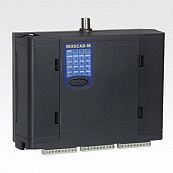MOSCAD-M SCADA Remote Terminal Unit
The smallest MOSCAD RTU, yet powerful and affordable
The MOSCAD-M RTU is the smallest member of the Motorola family of RTUs. It incorporates a fixed configuration of analog and digital inputs and outputs. MOSCAD-M is capable of communicating in a network with MOSCAD and ACE3600 RTUs. Although small in size the MOSCAD-M enough has power to satisfy a wide range of SCADA applications.
MOSCAD-M has a compact size and low power consumption which makes it ideal in outdoor locations with solar and battery power sources.
Features
MOSCAD-M is an intelligent RTU. While monitoring and controlling the remote site, it makes decisions based on local conditions, data imported from other sites and upon commands from the control center.
Typical MOSCAD-M applications include remote monitoring and control of valves and pumps; monitoring of tank levels, pipeline cathodic protection, rain and flood, environmental pollution, chemical spill, radioactive radiation and more.
It provides the features of both a Remote Terminal Unit (RTU) and a Programmable Logic Controller (PLC). If the application loaded into the CPU is simple, then MOSCAD-M functions as an RTU; if the application implements a decision-making code, then MOSCAD-M functions as a PLC.
MOSCAD-M is offered in basic I/O and expanded I/O configurations. Each MOSCAD- M model includes two serial ports and may include a two-way radio. An external wire-line modem or radio may be connected to the RTU.
MOSCAD-M commonly uses two-way radio for the communication channel. Operation on conventional, trunked or other specialised communication network supported. When two-way radio is not preferred, dial-up or leased wireline or Ethernet (10-base-T Intranet) communications is supported.
Features include:
- Dual functionality
- Diverse connectivity
- Motorola Data Link Communication (MDLC) Protocol
- Space efficiency
- Diverse networks supported
- Network adaptability
- Programmability
- Power management
About AIR
Products
Solutions


